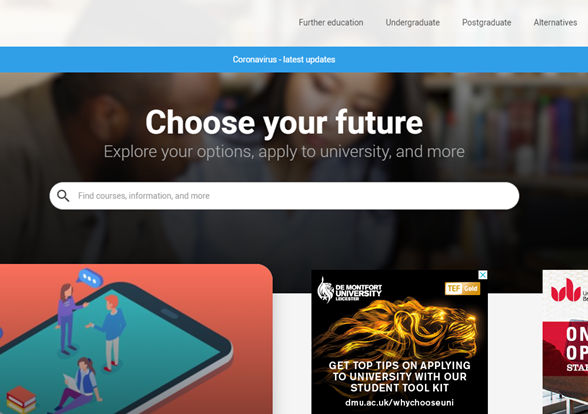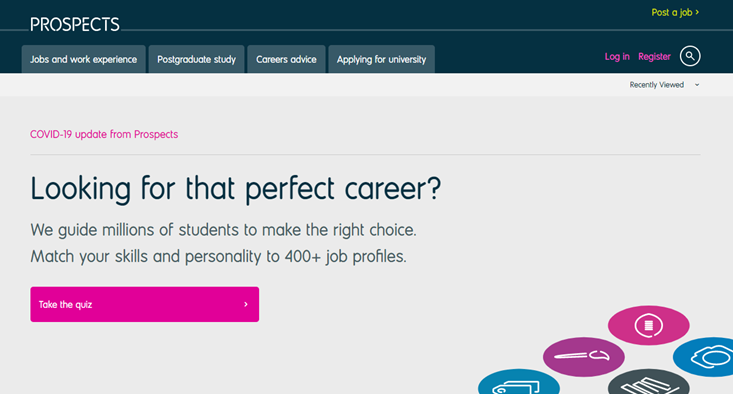Tips for deciding what to study at university
By Safiya Zaloum & Charlotte Morgan
So, you know you want to go to university, but how do you decide which course to apply for? It can be daunting trying to decide when faced with so many options. Here are our tips to help you choose a university course.
Think about your interests


It might sound obvious but really ask yourself – what am I interested in? Think about your A-levels and what you enjoy studying. This could be a whole subject, maybe even two subjects or just one topic. You’ll be spending a minimum of three years studying your chosen subject, so it’s really important that you enjoy learning about it!
It is also important to consider what you are good at. A university degree will be much more challenging than A-levels, so when making this decision you should play to your strengths. You will need to check that you are taking the right A-level subjects and whether you are on track to meet the required grades in order to be offered a place on your course of interest. This is where some thorough research comes in. Different courses and universities will have different requirements, so you’ll need to have a really good look around at all the options available to you, including alternative routes to a particular course or career, if you don’t quite have all the requirements.
Consider your future job opportunities
 It’s important to be practical and forward thinking when choosing your course. Look ahead to when you finish your degree. Do you like the options that will be available to you in your chosen subject area, and with your chosen qualification? Some jobs, such as being a doctor or engineer, require a specific degree. If you have a dream job in mind, try working backwards from that, and seeing what degrees would open up this option for you. On the other hand, you might have no idea what kind of job you want to do in future – that’s okay too! Many people go to university without having decided on the job or career they’d like in future. However it’s still important to be aware of your future job prospects based on your degree choice. You can research different career options here.
It’s important to be practical and forward thinking when choosing your course. Look ahead to when you finish your degree. Do you like the options that will be available to you in your chosen subject area, and with your chosen qualification? Some jobs, such as being a doctor or engineer, require a specific degree. If you have a dream job in mind, try working backwards from that, and seeing what degrees would open up this option for you. On the other hand, you might have no idea what kind of job you want to do in future – that’s okay too! Many people go to university without having decided on the job or career they’d like in future. However it’s still important to be aware of your future job prospects based on your degree choice. You can research different career options here.
General vs specific course
Another important thing to consider is whether you want to do a general course or a specific course. Browsing UCAS you’ll see there are hundreds of options available to you. Say you search for biology related courses, you’ll find that you can do a degree in biology, but you’ll also see options such as conservation biology, biomedical science, forensic science, sport science, human biology, marine biology and anthropology. There are so many variations out there that it can feel overwhelming. See below things to keep in mind when choosing between a general course, such as biology, and a specific course, such as forensic science.
A general degree:
- Keeps your options open
- Gives you more choice in terms of modules and more flexibility to explore different topics
- It’s possible that less time will be spent on your favourite topics & more time spent on topics you don’t enjoy
- You may need to do further study or training after your degree, depending on your career plans
A specific degree:
- Allows you to focus on your area of interest and deepen your knowledge of this area, with less of the topics you don’t enjoy
- Won’t be as flexible when it comes to choosing modules
- May provide you with a clearer route to a specific career path
- Career options could be limited without pursuing further study or training
It’s important to mention that no matter what you choose to study, there are likely to be elements of the course that you will find difficult, or that you don’t enjoy as much as others. Studying at university level is very different to school, and you may discover that you don’t like a particular topic as much as you thought you would, or conversely, you really enjoy a topic you previously disliked. There are some things you won’t know until you get there, and that’s okay. Keep in mind that no matter what you study, you will come out the other end of your degree with a fantastic range of transferable skills, and there will be a variety of career options open to you.
Look in detail at the course


Once you have decided which subject you want to study, you will still be faced with a lot of variation between very similar looking course titles at different universities. This is the time to do some more in depth research. We recommend making a spreadsheet of all the information, to help you keep track and compare different courses. It can be easy to forget which content is in which course when flicking between course pages online. Here are some things you might like to research:
What modules are available?
Look at the compulsory and optional modules for each year of study. Do you like the look of those topics? Is your favourite part of your subject not included? You could even find the unit guide, to give you more detail about what the course entails.
How are you taught and assessed?
Investigate the way the course is taught. Some courses are very theory heavy whereas others will have much larger practical elements. Increasingly, some universities are using the flipped classroom method of teaching. Consider how you like to learn as this will affect what you are doing day to day. Most courses will have a mix of lectures and practical classes, depending on the subject. You can also look into how your learning will be assessed – what percentage of the assessment will be exam based, for example?
While doing a deep dive into the details of a course, don’t be put off by something that sounds challenging. The whole point of doing a degree is for you to take your knowledge and skills to the next level. Inevitably, that will be challenging, but you will have plenty of support from your lecturers and tutors along the way.
Integrated Masters
The most popular option for a first degree is a Bachelors – a three year course. However many universities offer the option of signing up for four years instead of three, coming away with a Masters degree instead of a Bachelors degree. An integrated Masters course is especially useful for giving you an idea of what a career in academia and research would be like. Think about whether you feel ready to sign up for an extra year of study now, or if you’d rather keep your options open and wait until you’ve started at university to decide whether further study is for you.
Other opportunities
Many courses offer the option of a year abroad, where you can complete a year of study in another country. You can also do a four year course with a year in industry; this is where the university places you in a job related to your subject, giving you very valuable work experience before you graduate. Other courses may offer opportunities for internships. These are all options worth considering.
In conclusion, when it comes to choosing what to study, remember to:
- Go with your passions and interests
- Do lots of research
- Don’t forget that it’s okay to change your mind later on
Resources you can use to help you decide on a course:
- YouTubers studying your potential course – this is super useful as you will hear about the course from a student’s perspective. Alternatively, if you know anyone studying the subject you’re interested in this is a fantastic opportunity to quiz them on the fine details of their course and what it involves day to day.
- Internet guides for example, The Uni Guide is great for browsing university courses on offer, and they have this tool which gives you degree matches based on your A levels. UniFrog is another amazing tool that does personalised analysis of your options in depth however, you can only get this through your school.
- See what other people with your A levels did – sometimes you might need a little inspiration so why not see what others who came before you did. This should not be your only step in picking a degree but can give you some examples of where to start.




